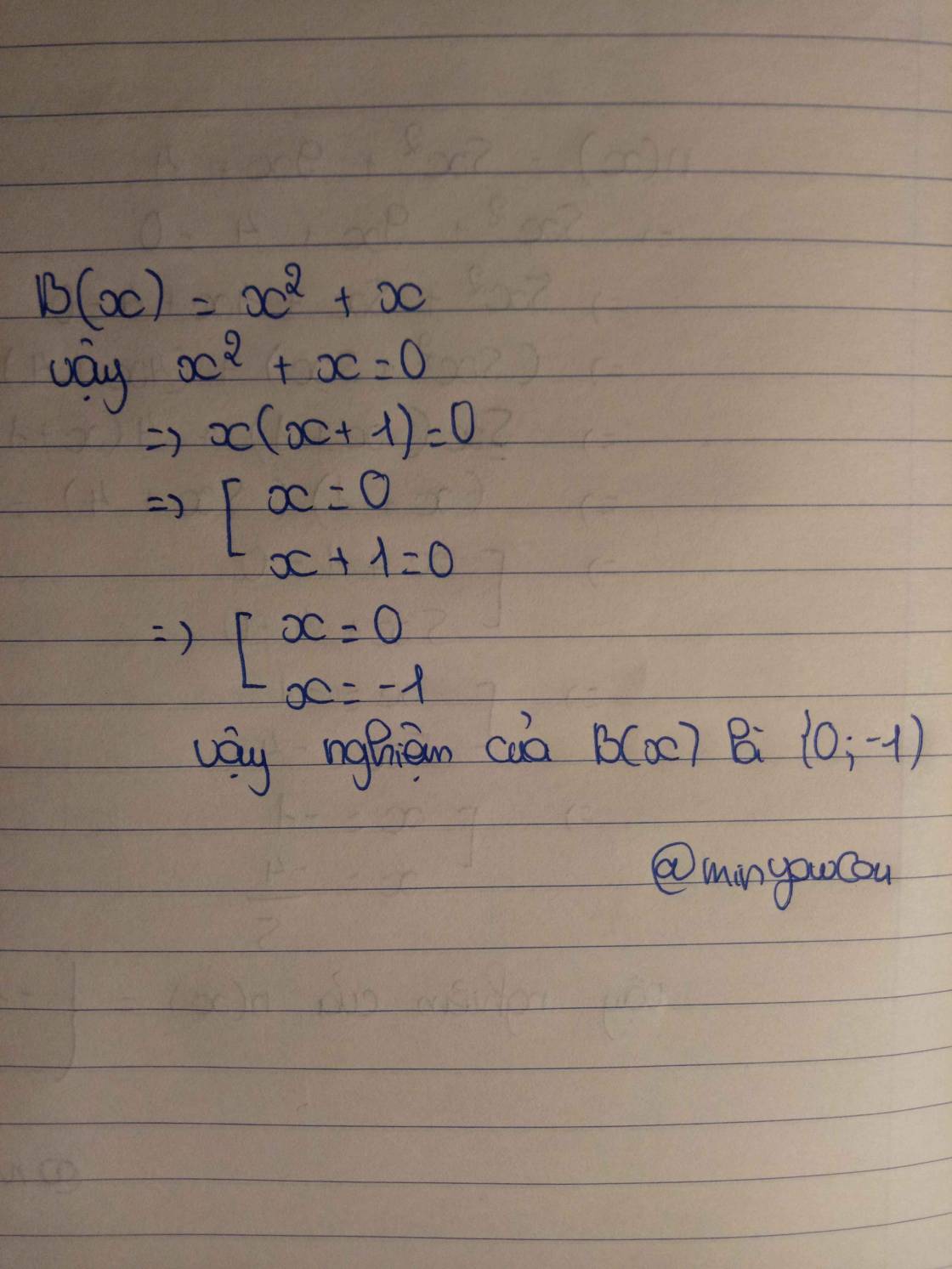
Hãy nhập câu hỏi của bạn vào đây, nếu là tài khoản VIP, bạn sẽ được ưu tiên trả lời.


a) f(x) = 0 ⇔ 4 - 5x = 0 ⇔ x = \(\dfrac{4}{5}\)
Nghiệm của f(x) là \(\dfrac{4}{5}\)
b)Không có nghiệm vì Với mọi x ∈ R thì \(x^2\) ≥ 0 ⇔ \(x^2\) + 4 ≥ 4 > 0
Do đó \(x^2\) + 4 > 0 hay \(x^2\) + 4 ≠ 0
Vậy f(x) không có nghiệm

a: f(x)=x^3-2x^2+2x-5
g(x)=-x^3+3x^2-2x+4
b: Sửa đề: h(x)=f(x)+g(x)
h(x)=x^3-2x^2+2x-5-x^3+3x^2-2x+4=x^2-1
c: h(x)=0
=>x^2-1=0
=>x=1 hoặc x=-1

a: f(x)=3x^4+2x^3+6x^2-x+2
g(x)=-3x^4-2x^3-5x^2+x-6
b: H(x)=f(x)+g(x)
=3x^4+2x^3+6x^2-x+2-3x^4-2x^3-5x^2+x-6
=x^2-4
f(x)-g(x)
=3x^4+2x^3+6x^2-x+2+3x^4+2x^3+5x^2-x+6
=6x^4+4x^3+11x^2-2x+8
c: H(x)=0
=>x^2-4=0
=>x=2 hoặc x=-2

\(a,x^2-2=0\Leftrightarrow x^2-\left(\sqrt{2}\right)^2=0\Leftrightarrow\left(x-\sqrt{2}\right)\left(x+\sqrt{2}\right)=0\Leftrightarrow\left[{}\begin{matrix}x=\sqrt{2}\\x=-\sqrt{2}\end{matrix}\right.\)
Vậy \(S=\left\{-\sqrt{2};\sqrt{2}\right\}\)
\(b,x\left(x-2\right)=0\Leftrightarrow\left[{}\begin{matrix}x=0\\x=2\end{matrix}\right.\)
Vậy \(S=\left\{0;2\right\}\)
\(c,x^2-2x=0\Leftrightarrow x\left(x-2\right)\) phương trình như câu b,
\(d,x\left(x^2+1\right)\Leftrightarrow\left[{}\begin{matrix}x=0\\x^2+1=0\end{matrix}\right.\Leftrightarrow\left[{}\begin{matrix}x=0\\x^2=-1\left(voli\right)\end{matrix}\right.\)( voli là vô lí )
Vậy \(S=\left\{0\right\}\)

B(x) = x2+x
Đặt B(x) = 0
=> x2+x=0
x.x + x = 0
x(x+1)=0
TH1: x = 0
TH2: x+1 = 0
x = -1
Vậy nghiệm của B(x) là x=-1

Cho A(x) = 0, có:
x2 - 4x = 0
=> x (x - 4) = 0
=> x = 0 hay x - 4 = 0
=> x = 0 hay x = 4
Vậy: x = 0; x = 4 là nghiệm của đa thức A(x)

a/ \(M\left(x\right)=-x^2+5\)
Có \(-x^2\le0\forall x\)
=> \(M\left(x\right)\le5\forall x\)
=> M(x) không có nghiệm.
2/
Thay \(x=\dfrac{1}{2}\) vào đa thức M(x) có
\(M\left(\dfrac{1}{2}\right)=\dfrac{1}{4}a+\dfrac{5}{2}-3=0\)
\(\Leftrightarrow\dfrac{1}{4}a=\dfrac{1}{2}\)
\(\Leftrightarrow a=2\)
Vậy...

\(G\left(x\right)=x^2-5=0\\ \Rightarrow x^2=5\\ \Rightarrow x=\pm\sqrt{5}\)